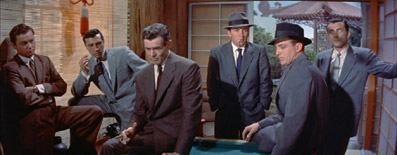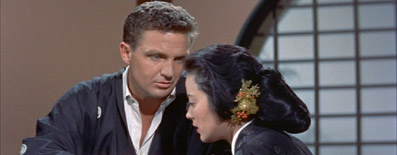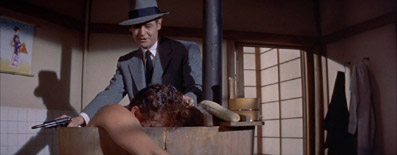|
Sometimes
I get the feeling that a portion of the critical fraternity
only grudgingly accepts Sam Fuller as a director of note,
swayed by the acclaim from filmmakers whose opinion they
value (Martin Scorsese, Wim Wenders, Bertrand Tavernier,
Jonathan Demme, Quentin Tarantino, et al), but actually not
that keen on many of Fuller's films. Fuller is seen a workmanlike
teller of B-movie style yarns who occasionally made something
special that it's genuinely OK to admire, as with Shock
Corridor, Naked Kiss or The Big
Red One.
House
of Bamboo generally doesn't make that list and
as a result often gets unfairly dismissed. The detractors
tend to have the same complaints, that the setting is irrelevant,
that indigenous gangsters the Yakuza don't even get a mention,
and that the concept of a group of ex-American servicemen
running rackets on Japanese soil behind a front of pachinko
arcade management is impossibly far-fetched. These factors,
they infer, render any other qualities largely
moot. I beg to differ. An involving, hard-boiled thriller
in its own right, House of Bamboo is also
a fascinating barometer of western attitudes to Japan in
the post-war years, and one whose plot and characters are
neither as fanciful nor out-of-date as some have suggested.

In
mid-50s Tokyo, a train is hijacked and a consignment of
arms stolen, a robbery that leaves one of the gang – an
American ex-soldier – shot by his own colleagues and left
for dead. He's questioned by the American military but dies
without revealing anything. Enter Eddie Kenner, an ex-soldier
with a criminal record and a bad attitude who tries his
luck squeezing protection money out of pachinko parlour
managers. He doesn't get far. He's only on his second such
threat when he is thrown at the feet of Sandy Dawson, the
head of a gang made up of former American servicemen who
run a sizeable number of the city's pachinko arcades, which
serve as a front for their criminal activities. Impressed
by Eddie's shady history, Sandy recruits and takes quite a liking
to him, not realising that his criminal record has been
carefully falsified and that Eddie is working undercover
for the US military.
The
first American feature to be shot completely in Japan, House of Bamboo takes an inevitably tourists-eye view of Tokyo, to the
degree that reality has been doctored to conform to a 1950s
Western view of how Japan should look. Thus almost every
woman you see is dressed in a kimono, Fuji mountain and Kamakura's Daibutsu (giant
Buddha) are prominently featured, and walls and shops are
plastered with signs that sometimes make no literary sense, kanji
characters selected for their visual appeal rather than meaning.
But the location shooting also captures detail that would
simply not have been present in a US-based production, such as the
western hairstyles sported by women already developing a
taste for all things American, signs of the early stages of a soon to accelerate economic
and industrial recovery, and streets startlingly
light on traffic when compared to modern day Japan. And
its always good to hear actual Japanese spoken instead of
comically accented English, even if it is confined to the
background characters.
Made
just ten years after the end of World War 2 and only three years after
official US occupation ended, the film also reflects America's
changing but still uncertain attitudes to the issue of mixed
race relationships. Eddie's romantic and (we presume) sexual
involvement with Mariko had its real-life equivalent in the GIs stationed in Japan who became involved with and in many
cases married local girls, but this was still largely uncharted
territory in American movies (Joshua Logan's prejudice-busting
Sayonara was still two-years off), something
the caucasian edge to actress Shirley Yamaguchi's looks and word-perfect English were no doubt concessions to.
The film also captures the local hostility to such relationships,
with Mariko subsequently shunned by her immediate neighbours,
a prejudice you'll still find distinct traces of in present-day Japan.

The
concept of a group of American gangsters running pachinko
parlours has come in for particular ridicule, but in post-war
Japan the pachinko arcades were largely under Chinese
or Korean ownership and their links to organised crime
are legendary. I'm not aware of evidence that gangland America
had a stake in the post-war pachinko business, but in the
'what if' stakes, this is not as far fetched as some have
suggested.
Not
all of the elements are specific to the time the film was made.
Eddie's embarrassment at the whole Japanese bathing experience
is something I've observed more than once as westerners
encounter their first onsen bath, and his attempts to communicate
by speaking English slowly and loudly at the locals
remains depressingly common amongst the lazier western tourists.
And in the present world situation, you can read what you like
into the concept of ex-members of an occupying army exploiting
the local population in the pursuit of unprincipled profit.
But
in the end, House of Bamboo lives or dies
not by its social subtext but its effectiveness
as a crime thriller, and although short on plot complexity
and originality (the film is a partial remake of William
Keighley's 1948 The Street with No Name),
Fuller's brisk, no-nonsense handling, Joe MacDonald's scope
cinematography and Robert Ryan's deliciously judged turn
as the cool but deadly Sandy Dawson invigorate the story, charging it
with the sort of fat-free energy that gave so many of Fuller's
movies the edge over their bigger-budgeted brethren. There's
little of the lively character interplay that distinguished
several of the director's early films, but his distinctive
stamp is still evident throughout, from the unflinching
brutality of Dawson's justice to the thrillingly executed
tracking shot as the gang flee a robbery and an audacious
climactic high-rise funfair shoot-out. House of
Bamboo may not be top drawer Fuller, but it's still
a worthy, enjoyable and smartly executed work that deserves
more than the casual dismissal it too often receives.
Framed
in its original 2.55:1 CinemaScope ratio and anamorphically
enhanced, it's hard to believe from the transfer here that
House of Bamboo is over 50 years old. The
picture quality is consistently excellent for a film of
this vintage, with colour, contrast and sharpness all very
impressive, the slightly unnatural hues familiar to colour
films of the period. There's hardly a dust spot here and
no sign of scratches or other damage. Nice one.

The
second surprise is the stereo soundtrack, which is true
to the 4-track stereo original, including its distinct separation. Designed for speakers positioned behind the scope screen,
it can seem a little over-sensitive on home systems with
widely spread front speakers. This is never a problem, though,
and sound quality is otherwise clean and clear.
Trailer
(2:16)
A none-too-subtle sell that likes the word 'sensational'.
A
sometimes unfairly maligned gangster thriller that uses
its Japanese locations well and whose relaxed multiculturalism
is typical of the director's early works. There's plenty
here to whet the appetite of Fuller devotees, in the hard-boiled
action, in Robert Ryan's splendidly played vilaain, and in the ruthless
nature of gang justice. It looks terrific on Optimum's DVD,
though loses out slightly to Fox's US release, which includes
a James Ursini and Alain Silver commentary, behind-the-scenes
and Movietone news footage.
|